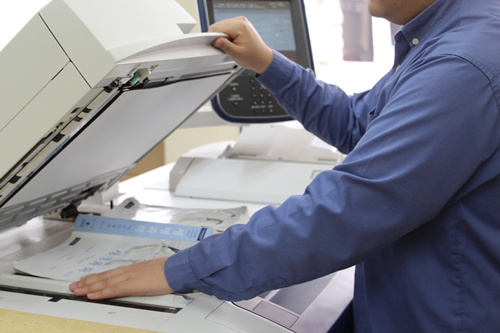How Much Do You Know about Copyright Infringement!
By Kim Su-yeon, Tribune Reporter
Last January, five universities litigated for revocation of the government’s notification regarding copyrights and that universities should pay a compensation fee to use copyrighted materials in class. It is a legal reaction to the lawsuit that the Korea Reprographic and Transmission Rights Association filed against six universities in 2012. Though copyright infringement has always been an issue at almost all Korean universities since 2010 when the current law was introduced, these are the first copyright lawsuits over teaching materials at universities. Copyright violation is frequently committed at universities, especially when a new semester begins. Chonnam National University (CNU) is no exception to this situation.

What Is Copyright?
As a legal concept, copyright is a part of Intellectual Property Rights that give the creator an exclusive right over the use of his/her various intangible assets. Copyright is an author’s right related to literary and artistic works such as books and other writings, and author’s rights consist of an author’s property rights and moral rights. It means if authors register copyrights for their creative works, their rights are protected by copyright both morally and economically. Many people have a tendency to ignore copyright infringement because copyright awareness lacks in Korea. However, it has a long history. The world’s first copyright was enacted by Queen Anne in England in 1710. Copyright law at that time was invented to give respectable rights to the creator of an original work in the field of the printing press, so it gave the publisher the right for a fixed period. As it was focused on literary works, the first copyright was called a literary property right. After then, with the growth of capitalism, the application of copyright law extended to various fields and became a worldwide issue. In the 1880 Berne Convention, copyright was first established as an international agreement.
Copyright Infringement at Universities
There are many students making copies of textbooks rather than buying the original books at CNU. It is a common example of copyright violation because such duplications are prohibited by copyright law. They are usually not aware of copyright laws regarding binding copied materials and copying books as copyright infringement. Many students hardly know that book-binding and copying is illegal. Another example is jokbo, sample questions from previous tests of the class, which is also under copyright that is automatically in force without the authors’ registration. Students can easily buy jokbo at most photocopy shops around campus, even though copying or selling it is apparently illegal. However, students as well make copies of test papers and hand it down to their juniors, which has turned out to be a culture through time.
Students say that the expensive price of textbooks and limited pages used for a class during the semester make them resort to bound or copied books. For this reason, the bookstore inside the CNU Student Union Building Ⅰ has difficulty in managing it. Manager Na Jong-soo who works for the bookstore said around 30 percent of enrolled students seems to buy required books in the store every semester. “At the maximum, there are 15 students a day at the first week in March who want to change books or get a refund for their purchase, but some of them ask for repayment because they have copied and bound the books.” Shin Jin-young (Sophomore, School of Economics) said, “I have never copied and bound materials for a book. I have no interest in such books. I think the original book makes me concentrate on the content of the book when I study with it.”
Be Conscious of Copyrights!
In April 2011, the Ministry of Culture, Sports and Tourism (MCST) notified several universities about the compensation. According to Article 25 of the Korean Copyright Law and Notification No.2011-17 of the MCST, universities should pay for using copyrighted materials in class without prior permission of the authors. But five universities including Seoul National University sued the MCST on January 5th for demanding to cancel the notification that has no validity of a law. They claimed Article 25 says universities should pay compensation fee at a higher level than high schools, and this is not reasonable.
With regard to this matter, Kim Won-joon, professor of the Department of Law, said, it is not easy for many people to feel guilty about copyright infringement because of the characteristics of Korean culture sharing and using some things with others is regarded as a general custom. He added, “Even if the Article 30 of the Copyright Law respected personal use of copying, but students should be conscious of copyright.” Copyright, in general, protects the original works for about 50 years. Within this period, in the most extreme case, less than five years in prison or under 50 million won can be charged for the infringement of a copyright. Copyright-related legal suits are rising at a rapid pace and copyright violation is considered as theft in this age of capitalism. Students, as well as universities should be aware of copyrights which have been increasingly spreading its domain.
김수연 기자
turc04@hanmail.net

